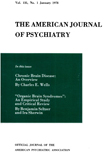Studies of the Deaf: Relevance to Psychiatric Theory
Abstract
The author reports observations extending over 16 years of persons with early total deafness. Despite the variety and severity of early stresses, schizophrenia did not appear with unusual frequency, although hallucinations (alleged to be auditory) occurred in about the same proportion as in schizophrenics with hearing. Obsessional character problems and psychotic depression were rare, but an increase in impulsive behavior was noted; the author hypothesizes that audition is somehow necessary to the internalized control of rage.
Access content
To read the fulltext, please use one of the options below to sign in or purchase access.- Personal login
- Institutional Login
- Sign in via OpenAthens
- Register for access
-
Please login/register if you wish to pair your device and check access availability.
Not a subscriber?
PsychiatryOnline subscription options offer access to the DSM-5 library, books, journals, CME, and patient resources. This all-in-one virtual library provides psychiatrists and mental health professionals with key resources for diagnosis, treatment, research, and professional development.
Need more help? PsychiatryOnline Customer Service may be reached by emailing [email protected] or by calling 800-368-5777 (in the U.S.) or 703-907-7322 (outside the U.S.).



